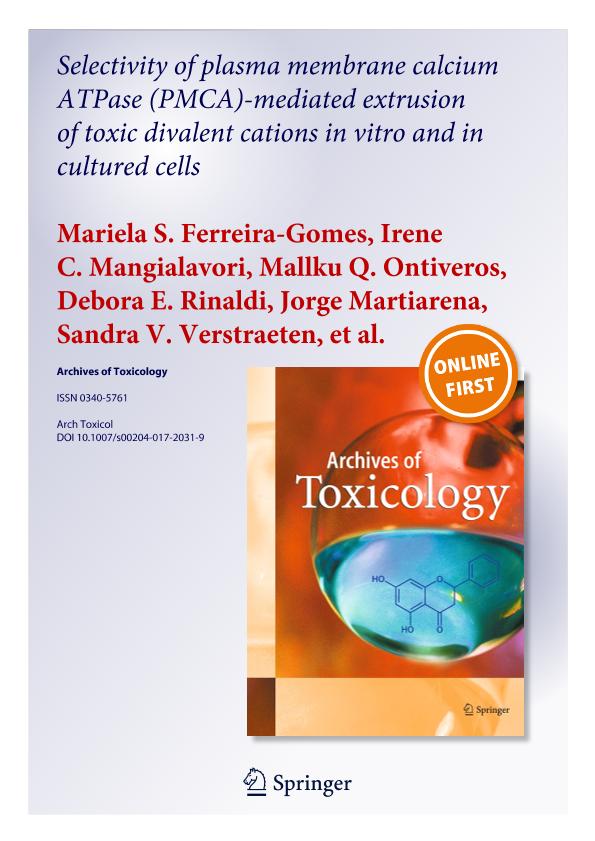Artículo
Selectivity of plasma membrane calcium ATPase (PMCA)-mediated extrusion of toxic divalent cations in vitro and in cultured cells
Ferreira Gomes, Mariela Soledad ; Mangialavori, Irene Cecilia
; Mangialavori, Irene Cecilia ; Ontiveros, Mallku Qhapaj
; Ontiveros, Mallku Qhapaj ; Rinaldi, Debora Eugenia
; Rinaldi, Debora Eugenia ; Martiarena, Jorge Luis
; Martiarena, Jorge Luis ; Verstraeten, Sandra Viviana
; Verstraeten, Sandra Viviana ; Rossi, Juan Pablo Francisco
; Rossi, Juan Pablo Francisco
 ; Mangialavori, Irene Cecilia
; Mangialavori, Irene Cecilia ; Ontiveros, Mallku Qhapaj
; Ontiveros, Mallku Qhapaj ; Rinaldi, Debora Eugenia
; Rinaldi, Debora Eugenia ; Martiarena, Jorge Luis
; Martiarena, Jorge Luis ; Verstraeten, Sandra Viviana
; Verstraeten, Sandra Viviana ; Rossi, Juan Pablo Francisco
; Rossi, Juan Pablo Francisco
Fecha de publicación:
07/2017
Editorial:
Springer
Revista:
Archives of Toxicology
ISSN:
0340-5761
Idioma:
Inglés
Tipo de recurso:
Artículo publicado
Clasificación temática:
Resumen
In the recent years, the toxicity of certain divalent cations has been associated with the alteration of intracellular Ca2+ homeostasis. Among other mechanisms, these cations may affect the functionality of certain Ca2+-binding proteins and/or Ca2+ pumps. The plasma membrane calcium pump (PMCA) maintains Ca2+ homeostasis in eukaryotic cells by mediating the efflux of this cation in a process coupled to ATP hydrolysis. The aim of this work was to investigate both in vitro and in cultured cells if other divalent cations (Sr2+, Ba2+, Co2+, Cd2+, Pb2+ or Be2+) could be transported by PMCA. Current results indicate that both purified and intact cell PMCA transported Sr2+ with kinetic parameters close to those of Ca2+ transport. The transport of Pb2+ and Co2+ by purified PMCA was, respectively, 50 and 75% lower than that of Ca2+, but only Co2+ was extruded by intact cells and to a very low extent. In contrast, purified PMCA—but not intact cell PMCA—transported Ba2+ at low rates and only when activated by limited proteolysis or by phosphatidylserine addition. Finally, purified PMCA did not transport Cd2+ or Be2+, although minor Be2+ transport was measured in intact cells. Moreover, Cd2+ impaired the transport of Ca2+ through various mechanisms, suggesting that PMCA may be a potential target of Cd2+-mediated toxicity. The differential capacity of PMCA to transport these divalent cations may have a key role in their detoxification, limiting their noxious effects on cell homeostasis.
Archivos asociados
Licencia
Identificadores
Colecciones
Articulos(IQUIFIB)
Articulos de INST.DE QUIMICA Y FISICO-QUIMICA BIOLOGICAS "PROF. ALEJANDRO C. PALADINI"
Articulos de INST.DE QUIMICA Y FISICO-QUIMICA BIOLOGICAS "PROF. ALEJANDRO C. PALADINI"
Citación
Ferreira Gomes, Mariela Soledad; Mangialavori, Irene Cecilia; Ontiveros, Mallku Qhapaj; Rinaldi, Debora Eugenia; Martiarena, Jorge Luis; et al.; Selectivity of plasma membrane calcium ATPase (PMCA)-mediated extrusion of toxic divalent cations in vitro and in cultured cells; Springer; Archives of Toxicology; 92; 1; 7-2017; 273-288
Compartir
Altmétricas



